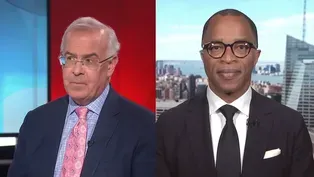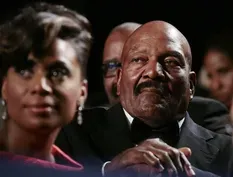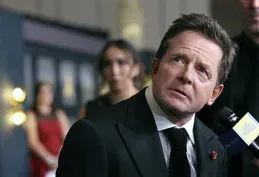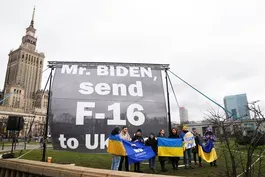
'Shadow Docket' explores Supreme Court's growing influence
Clip: 5/19/2023 | 6m 38sVideo has Closed Captions
New book 'Shadow Docket' explores Supreme Court's growing influence on American law
A new book explores the Supreme Court's growing influence on the country through emergency actions on cases not on the official docket. For the past decade or so, the court has gotten involved in cases concerning big issues, often setting new principles without hearing arguments and without explaining their reasoning. John Yang discussed that with Stephen Vladeck, writer of "Shadow Docket."
Problems with Closed Captions? Closed Captioning Feedback
Problems with Closed Captions? Closed Captioning Feedback
Major corporate funding for the PBS News Hour is provided by BDO, BNSF, Consumer Cellular, American Cruise Lines, and Raymond James. Funding for the PBS NewsHour Weekend is provided by...

'Shadow Docket' explores Supreme Court's growing influence
Clip: 5/19/2023 | 6m 38sVideo has Closed Captions
A new book explores the Supreme Court's growing influence on the country through emergency actions on cases not on the official docket. For the past decade or so, the court has gotten involved in cases concerning big issues, often setting new principles without hearing arguments and without explaining their reasoning. John Yang discussed that with Stephen Vladeck, writer of "Shadow Docket."
Problems with Closed Captions? Closed Captioning Feedback
How to Watch PBS News Hour
PBS News Hour is available to stream on pbs.org and the free PBS App, available on iPhone, Apple TV, Android TV, Android smartphones, Amazon Fire TV, Amazon Fire Tablet, Roku, Samsung Smart TV, and Vizio.
Providing Support for PBS.org
Learn Moreabout PBS online sponsorshipAMNA NAWAZ: A new book out this week explores the Supreme Court's growing influence on the country through a number of emergency actions on cases not on the official docket.
John Yang explains.
Many of us were taught in civics class that the Supreme Court is the court of last resort, that cases end up there after all other appeals have been exhausted.
But for the last decade or so, the court has gotten involved in cases while the appeals process is going on, either blocking or keeping in place policies on issues like abortion, immigration and COVID restrictions, often setting new principles without hearing arguments and without explaining their reasoning.
It's part of what's become known as the shadow docket, which is the title of a new book by Stephen Vladeck, a University of Texas law professor.
First off, I gave a very incomplete description of one small part of the shadow docket.
How -- explain what it is.
STEPHEN VLADECK, Author, "The Shadow Docket: How the Supreme Court Uses Stealth Rulings to Amass Power and Undermine the Republic": Yes.
I mean, so, it's an umbrella term, John, that basically describes everything the Supreme Court does, other than the 60 or so big merits rulings we get each term.
That's the ones that we're used to seeing big headlines about.
It's only about 1 percent of what the court does; 99 percent of the dispositive rulings the Supreme Court hands down are these unsigned, unexplained orders.
Most of them are anodyne.
But, increasingly, a lot of them are not.
JOHN YANG: You write that this began to take off in the '80s and '90s with death penalty cases.
Obviously, there's urgency there because they -- the executions are scheduled.
But you also say that it really accelerated and changed under the Trump administration.
STEPHEN VLADECK: That's right.
So the real sort of rise of what we think of as the modern flurry of this kind of emergency application, where the court is being asked to intervene early in a case and not as the court of last resort, starts with the reinstitution of the death penalty in the late '70s.
But, John, it stays over there in the death penalty space for the better part of 35 years.
You asked folks who clerked on the court in that period, and they will say, yes, we had death cases, but not these other ones.
What really shifts in the mid 2010s -- and President Trump's Justice Department is a big part of the cause of this shift -- is the court taken approaches that had become normalized in the death penalty context, full court decisions without oral argument, without a lot of briefing, with no explanation, and now applying it to whether particular immigration policies will be in effect or not while the case works its way through the courts, whether state abortion bans will be in effect or not, whether COVID vaccination mandates will be affected or not, having all of these monumental impacts on us out in the world, far more so than was ever true in the death penalty context.
JOHN YANG: What's wrong with it?
What's the problem with it?
STEPHEN VLADECK: So there's no problem in the abstract with the idea of the Supreme Court gets emergencies.
Any appellate court is going to have to have some mechanism for resolving those kinds of exigent cases.
The problem we have seen in the last five or six years is the way that justices are intervening.
They're intervening more often than ever before, with these broad impacts, without any real explanation, and perhaps, most significantly, John, in ways that actually aren't explainable by reference to any overarching neutral legal principle.
Instead, way too often, the best predictor of who's going to win a shadow docket application is the partisan valence of the dispute, where the justices seem to be siding with Trump policies, but against Biden policies, with red states, but against blue states, where the absence of any explanation deprives us of any reason to feel confident that there are neutral principles here at work, and not just political actors acting politically.
JOHN YANG: There was a recent "NewsHour"/NPR/Marist poll that found that 62 percent of those questions said they had not very much or no confidence in the court.
Is this part of that problem?
STEPHEN VLADECK: I think it is.
And, indeed, I think that these are both symptoms of the same disease, which is a court that is acting in lots of ways, whether it's with regard to emergency applications or ethics, in ways that are just unchecked, unexplained, un-transparent.
And, John, I think the most important part of that survey, of that statistic is that conservatives should be just as invested in public competence in the Supreme Court as progressives who are critical of it.
That's where I think this conversation needs to go.
It's a big part of what I hope the book will accomplish.
JOHN YANG: There have been a lot of calls for changes on the court, legislation introduced that there be a code of ethics, to expand the number of justices on the court, set an age limit.
What does meaningful -- a meaningful solution to the problems before the court, what would -- what does that look like?
STEPHEN VLADECK: I think that all starts from the same place.
And it starts from some kind of congressional effort to reassert even a modicum of institutional, not control, but responsibility for the court.
For the first 200 years that we had a Supreme Court, Congress was actively involved in regulating the court, in shaping its docket, in controlling its budget, in forcing the justices to go out on the road six months out of the year.
Until 1935, the court sat in the Capitol.
And so there really was this synergy, this dynamic between Congress and the court that has really fallen by the wayside.
Folks are going to have their own views on which reforms are the most important.
But I think the story has to start and the book tries to start with a question of Congress taking responsibility for what James Madison said, ambition must be made to counteract ambition.
There's not a lot of ambition the court right now that's being counteracted by Congress.
But there's certainly a lot of ambition among the justices.
JOHN YANG: I want to ask you about a phrase in the subtitle of your book.
How is this undermining our republic?
STEPHEN VLADECK: So, I think the charge and the subtitle that some of these rulings are undermining the republic comes out most forcefully in chapter six, which talks about election cases, where we saw, in 2022, just two rulings, one about congressional district maps in Alabama and one about congressional district maps in Louisiana, where the court, through unsigned, unexplained orders, allowed these states to use maps that lower courts had struck down.
John, there's a pretty good argument that those two rulings by themselves might have been a critical part of how Republicans took control of the House in the midterm elections.
If you have the Supreme Court influencing elections that directly through rulings that are not principled, that are not explaining themselves, I think it's really hard to reconcile that with basic conceptions of how a republic is supposed to operate.
JOHN YANG: Stephen Vladeck of the University of Texas, author of "The Shadow Docket," thank you very much.
STEPHEN VLADECK: Thank you.
Brooks and Capehart on the debt ceiling negotiations
Video has Closed Captions
Clip: 5/19/2023 | 11m 1s | Brooks and Capehart on debt ceiling negotiations and Republicans joining the 2024 race (11m 1s)
Jim Brown's life and legacy as a football great and activist
Video has Closed Captions
Clip: 5/19/2023 | 7m 18s | A look at Jim Brown's life and legacy as a football great and activist (7m 18s)
Michael J. Fox tells his own story in new documentary
Video has Closed Captions
Clip: 5/19/2023 | 8m 26s | Michael J. Fox tells story of his career and living with Parkinson's in new documentary (8m 26s)
Syria welcomed back into Arab League after years of war
Video has Closed Captions
Clip: 5/19/2023 | 7m 27s | Syria and Assad regime welcomed back into Arab League after years of civil war (7m 27s)
U.S. will help train Ukrainian pilots on F-16 fighter jets
Video has Closed Captions
Clip: 5/19/2023 | 5m 52s | What the plan to provide F-16 fighter jets to Ukraine means for the war against Russia (5m 52s)
Providing Support for PBS.org
Learn Moreabout PBS online sponsorshipSupport for PBS provided by:
Major corporate funding for the PBS News Hour is provided by BDO, BNSF, Consumer Cellular, American Cruise Lines, and Raymond James. Funding for the PBS NewsHour Weekend is provided by...















